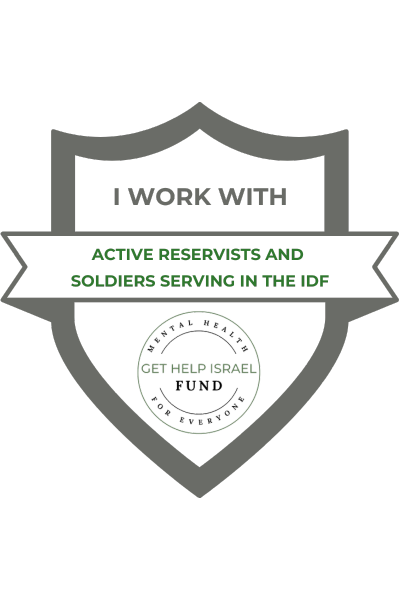Natalie Gar
Credentials
Cognitive Behavior Therapy (CBT) for Anxiety, OCD, and Trauma
Finances
Licensed in Israel
- Kikar Denya, Beit Hakerem
- Jerusalem
- Elazar
- Gush Etzion
Natalie Gar
 Verified
Verified
Credentials
Clinical Psychologist
Cognitive Behavior Therapy (CBT) for Anxiety, OCD, and Trauma
MA, PhD
Finances
350-500 NIS
N/A
N/A
- Kikar Denya, Beit Hakerem
- Jerusalem
- Elazar
- Gush Etzion
ABOUT THE THERAPIST
I am a psychologist who specializes in the assessment and treatment of Anxiety Disorders, OCD, and trauma in children, adolescents, and adults. I use a Cognitive Behavioral Therapy (CBT) approach as well as other treatment modalities where indicated. I have published articles in leading peer-reviewed journals. I grew up in Toronto, Canada and completed a B.A. in psychology at McGill University in Montreal. In 2002, I moved to Israel and subsequently to Sydney, Australia where I earned a Masters and PhD in Clinical Psychology, while training under world leaders in the field of anxiety disorders. On returning to Israel in 2009, I worked in the school system for 9 years and became a licensed School Psychologist. I currently maintain a private practice in Jerusalem and Gush Etzion. I consult in both English and Hebrew. I am committed to providing evidence based, high quality, empathic psychological services, tailored to each client’s individual needs and goals.
I specialize in the following mental health challenges:
Generalized Anxiety
Social Anxiety
Separation Anxiety
Specific Phobias
Test anxiety
Panic Disorder
Obsessive-Compulsive Disorder (OCD) and related conditions
Post-traumatic Stress Disorder
Depression
Adjustment and Life Transitions
Parent Counseling
QUALIFICATIONS
PhD, MA
Macquarie University
2008
Degree
PhD, MAEducation
Macquarie UniversityYear of Graduation
2008Years in Practice
14
REGISTERED PSYCHOLOGIST IN ISRAEL
Registration in Pinkas Hapsichologim
27-88010
Mumche Category
Clinical Psychologist
Mumche License Number
27-45211
DISTANCE COUNSELING
None
PRIMARY SPECIALTIES
Anxiety / Panic
Obsessive Compulsive Disorder (OCD)
Phobias
Trauma / Post Traumatic Stress Disorder PTSD
ADDITIONAL SPECIALTIES
Depression
Family Issues
Grief
Life Transitions
Mood Disorders
Parenting Issues / Training
Postpartum Depression
Self-Esteem
Spiritual Concerns
Stress Management
CLIENT FOCUS
Population
Children
Adolescents
Adults
Men
Women
Languages Spoken
Hebrew
English
TREATMENT APPROACH
Acceptance and Commitment Therapy (ACT)Acceptance and Commitment Therapy (ACT) is a form of psychotherapy that encourages individuals to accept their thoughts, feelings, and experiences without judgment and to use them as tools to help them to make changes in their lives that are consistent with their values. It is based on the idea that by changing the way we think about our inner experiences, we can reduce emotional distress and increase our sense of well-being.
Cognitive Behavioral Therapy (CBT)Cognitive Behavioral Therapy (CBT) is a type of psychotherapy that focuses on how one's thoughts, feelings and behaviors are connected and can be changed. It is based on the idea that how we think (cognition) and how we feel (emotion) can influence how we behave. CBT helps people identify and challenge distorted thinking and replace it with more balanced thinking, leading to improved mood and behavior. ‘Homework’, usually containing practical writing exercises, is often completed by the client between sessions to reinforce the therapy. Examples of tools that practitioners often use are journaling, challenging beliefs, and mindfulness.
Dialectical Behavior Therapy (DBT)Dialectical Behavior Therapy (DBT) is a type of cognitive-behavioral therapy developed by Marsha Linehan to help people learn to better manage and cope with emotions and stress. It focuses on developing skills and strategies to help regulate emotions, improve relationships and communication, and reduce self-destructive behaviors. Through DBT, people learn to identify and modify unhealthy thoughts and behaviors, while also learning to accept and validate their own feelings. DBT teaches skills to help individuals become aware of and accept and regulate their emotions, tolerate distress, and improve interpersonal relationships.
Trauma-Focused Cognitive Behavioral Therapy (TF-CBT)Trauma-Focused Cognitive Behavioral Therapy (TF-CBT) is an evidence-based practice used to help children, adolescents and their parents who have experienced a single or multiple traumatic events. This type of therapy combines cognitive and behavioral strategies to help people process their traumatic experiences, manage their distress, develop coping skills, and restore their sense of safety and well-being. TF-CBT focuses on education and skill-building, creating an environment of safety and trust, and using therapeutic activities to help people understand their responses and control their symptoms. Children are shown how perceptions may be distorted and are given the tools to redesign those perceptions. TF-CBT is a skills-based model, and it requires the child and parent to practice its components in order to be optimally effective. Parents and children are commonly asked to practice skills at home.
SERVICES OFFERED
Individual Therapy
Consultation
Hadrachat Horim

 Verified
Verified


